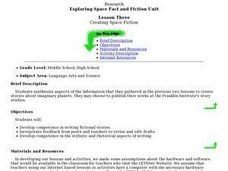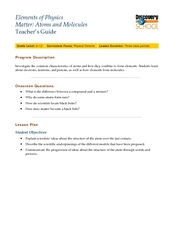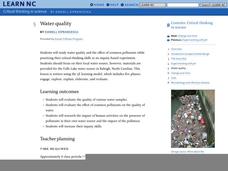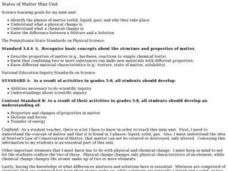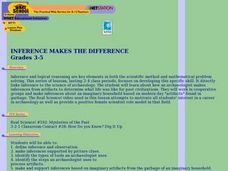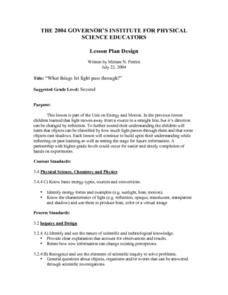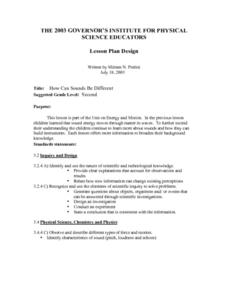Curated OER
Poster Assignment: Sports Chemistry
Tenth graders distinguish between chemical and physical properties and changes in matter when given specific examples. They view a video of sports activities. Students chose their favorite sport and design an experiment to improve sports...
Curated OER
Exploring Space Fact and Fiction Unit: Creating Space Fiction
Students create stories about imaginary planets.
Curated OER
What are Rocks and Minerals? How can they help us?
Sixth graders investigate the difference between rocks and minerals. They name the three kinds of rocks (sedimentary, igneous, and metamorphic) and know the differences between them.
Curated OER
Matter: Atoms and Molecules
Students investigate how information about the atom has been determined. In this atomic structure lesson, students draw what they think an atom looks like. They conduct Internet research about the types of atomic models and how...
Curated OER
Water Quality
Students analyze water quality and turbidity of collected samples. In this physics lesson, students conduct tests to identify the suspended particles in the samples. They explain how human activities affect water quality.
Curated OER
Inertia
Young scholars conduct an experiment to apply Newton's first law of motion. They observe the inertia of an object in regard to its mass. The students record and graph the outcomes of their investigation and present the relationship...
Curated OER
Exploring Space Fiction
Students visit web sites with information on space fiction and collect information for their stories.
Curated OER
States of Matter Mini-Unit
Students identify he phases of matter (solid, liquid, gas), and why they take place. They comprehend what a physical change is and what a chemical change is. Students know the difference between a Mixture and a Solution.
Curated OER
Inference Makes the Difference
Students explore how archaeologists make inferences from artifacts to explore what life was like in the past. For this archaeology lesson, students work in groups and make inferences about an imaginary household based on modern day...
Curated OER
What's Matter?
Students explore the definition of matter. In exploring matter lesson students get into groups and navigate the Internet to answer questions.
Curated OER
What Can We Lose? What Do We Lose as we Gain Force With A Lever?
Third graders view a demonstration of a teeter totter as a basis for assessing pre-knowledge of a lever. They create a KwL chart. Students work in small groups to conduct a variety of experiments. The first requires students to tie books...
Curated OER
Global Warming
Students examine how human produced emissions of carbon dioxide contribute to global warming. Using the internet, they research the future effects of global warming on the Earth. In groups, they discover ways to reduce daily energy...
Curated OER
Oil Embargo!
Ninth graders generate and analyze data to determine which and how much of two polymers best absorb oils, formulate procedure to accurately determine how many times its own weight particular polymer can absorb, and develop understanding...
Curated OER
MINI-UNIT on ELECTRICITY
Students identify hypotheses related to static electricity, to begin to test the hypotheses, to begin to develop conclusions related to observations, to demonstrate that like charges repel and unlike charges attract each other, to name...
Curated OER
Motion, Force, and Gravity
Learners write a research paper about human space travel. In this space travel lesson, students watch a video and research issues related to space travel. They use their research to write a paper about whether human space travel should...
Curated OER
Getting the "Yuck" Out
Students examine various types of household materials for their usefulness as filters. They work together in teams to design a filtration system that produces the cleanest water in the shortest time.
Curated OER
How's Your Horoscope?
Students examine the concept of astrology. They compare their traits with those of standard astrological descriptions. They discuss their findings.
Curated OER
Recycling by Composting
Students examine the idea of recycling by composting. Using the internet, they research the benefits of composting to the environment. In groups, they collect numbers on how much food and yard waste is produced in their community. ...
Curated OER
What things let Light Pass Through?
Second graders classify objects according to how well light can pass through them and predict how well objects will transmit light. They experiment with objects to verify predictions while collecting, recording, and interpreting data...
Curated OER
What Does Motion Have to do with Sound?
Second graders investigate and explore sound energy. They investigate how the vibrational motion moves through matter in waves. Students describe sounds and vibrations. They observe that vibrational motion creates sounds. Students record...
Curated OER
How Can Sounds Be Different
Second graders explore energy and motion. They investigate how sound energy moves in waves. Students explore how sounds are varied and how the instruments that make those sounds are built. They observe sounds being produced and predict...
Curated OER
Changes In Matter, "The Big Chill"
Third graders investigate why ice cream does not go through any chemical changes when it is exposed to physical changes. They describe the three states of matter in either written or verbal form. Then students experiment with ice cream...
Curated OER
How Do The Colors of Light Mix?
Students investigate the mixing of light. They form a hypotheses to reason why color changes occur and they write conclusions and ask new questions arising from the investigation. Students identify the primary and complementary colors of...
Curated OER
What is Sound? How Can We Change Sound?
In this lesson, students investigate the phenomenon of sound! Students compare and contrast how sound travels through solids, liquids, and gases. They explain how length and thickness affect sound. Students know the difference between...



